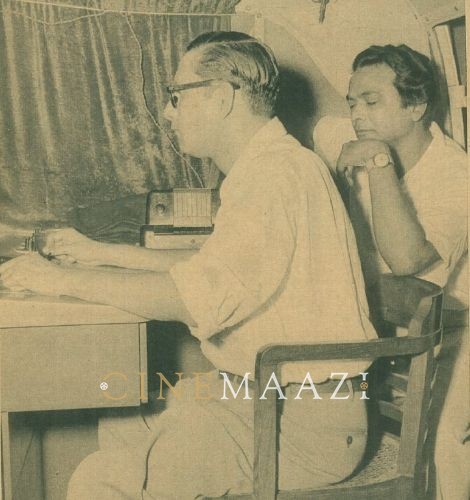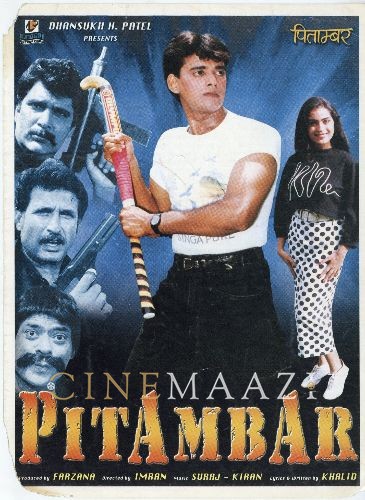Naushad Ali

Subscribe to read full article
This section is for paid subscribers only. Our subscription is only $37/- for one full year.
You get unlimited access to all paid section and features on the website with this subscription.
Not ready for a full subscription?
You can access this article for $2 , and have it saved to your account for one year.
- Born: 25/12/1919 (Lucknow)
- Died: 05/05/2006 (Bombay)
- Primary Cinema: Hindi
- Parents: Wajid Ali Shah
The man who changed the face of Hindi film music over a career spanning nearly seven decades, Naushad was born in central Lucknow (then Awadh) on 25 December 1919. His father, Wahid Ali was a munshi at the court of Nawab Wajid Ali Shah. A conservative man and a devoted Muslim, Wahid Ali was discomfited by Naushad’s growing interest in music throughout his childhood. With the advent of silent films, musicians would play live music in the theatre during the screening. As a young boy, Naushad would often visit the theatre with his cousin to listen to the music being played. His eagerness to learn the harmonium led him to work at a store for musical instruments. Impressed with his hard work and dedication, the shop owner gifted him a harmonium. This incensed his father further, and when asked to choose between music and home, Naushad chose to follow his love for music.
Having left home, Naushad trained in playing the harmonium under the tutelage of Ustad Baban Khan, and learnt the sitar from Ustad Yusuf Ali. He worked as an instrumentalist with a travelling theatre company for a while, but unfortunately, the company shut down due to financial constraints when they were in Gujarat. Naushad, then just eighteen, decided to try his luck in the city of Bombay.
For a while, he stayed with a distant relative in Colaba, but went searching for employment in Dadar, the hub of cinema studios, on an empty stomach. The footpath opposite Dadar’s Broadway Cinema became his refuge for some time. Soon, he was hired as a pianist by Ustad Jhande Khan Sahib for a monthly salary of Rs. 40. He played various instruments on the sets of many silent films. Noticing his dedication to his craft, Jhande Khan promoted him to the role of his assistant. He also assisted other composers of the time like Manohar Kapoor, Mushtaq Hussain and Khemchand Prakash. To make ends meet, he worked at the Young India Gramophone Company at the same time, where he was paid Rs. 100 a month.
As part of Mushtaq Hussain’s team, he worked in films like Nirala Hindustan (Mohan Sinha, 1938) and Baaghban (Kardar, 1938). His turning point came when he composed the song Bata do koi kaun gali more shyam for Kanchan (Manibhai Vyas, 1941). Incidentally, his first film as an independent composer, Prem Nagar (Mohan Dayaram Bhavnani, 1940) released a year before Kanchan.
While working on films like Nai Duniya (1942) and Sharda (1942), Naushad established a close professional relationship with A.R. Kardar. This led to further fruitful collaborations between the two with films such as Kanoon(1943), Namaste (1943), Sanjog (1943), Geet (1944), Jeevan (1944) and Pehle Aap (1944). Naushad rose to greater heights of fame with the songs of Rattan (1944), establishing himself as one of the top music composers of his era. He continued to enjoy success with his music in films like Dulari (1949), Babul (1950),Dastaan (1950), Deedar (1951), Jadoo (1951), Aan (1952), Baiju Bawra (1952) and Deewana (1952). For his work in Baiju Bawra, Naushad received the first Filmfare Award for the Best Music. He was adept at suiting himself to the times, even incorporating Western elements in his music in the song Jab nain mile naino se in Jadoo.
Well aware of the struggle newcomers faced in the industry, Naushad lent a helping hand to artists like Majrooh Sultanpuri—whom he gave a break with Shahjehan (1945)—and Shakeel Badayuni, who worked with him in Dard (1947). The singer Uma was also introduced by Naushad, and later he brought her to the screen as an actress in Babul under the name Tuntun. Singers like Mohammed Rafi, Geeta Dutt, K.L. Saigal, Lata Mangeshkar and Kishore Kumar also worked with Naushad.
Though the music for Amrohi’s Pakeezah (1971) proved to be very successful, only Ghulam Mohammad was credited for it, leaving Naushad’s name out. Unable to reconcile fully with the changing times, Naushad started to fade from the top league. Although he continued to compose for films like Sunehra Sansar (1975) and Chambal Ki Rani (1979), his glory days had passed. He last composed for the films Guddu (1995) and Akbar Khan’s Taj Mahal (2005).
For his immense contribution to Hindi film music, Naushad was awarded with a Padma Bhooshan, the Sangeet Natak Akademi Puraskar, the Dadasaheb Phalke Award and numerous state awards. He also tried his hand at production with Babul, Uran Khatola (1955) and Maalik (1958). He was also a gifted writer.
A father to six daughters and three sons, Naushad passed away on 5 May 2006 at the age of 87. He spent most of his life in his bungalow ‘Aashiana’ on Carter Road, Bandra (West). The Maharashtra Government and the Mumbai Mahanagar Palika honoured his legacy by renaming Carter Road Sangeetkar Naushad Ali Marg on his second death anniversary.
-
Filmography (1)
SortRole
-

Pitambar 1992
-







.jpg)



